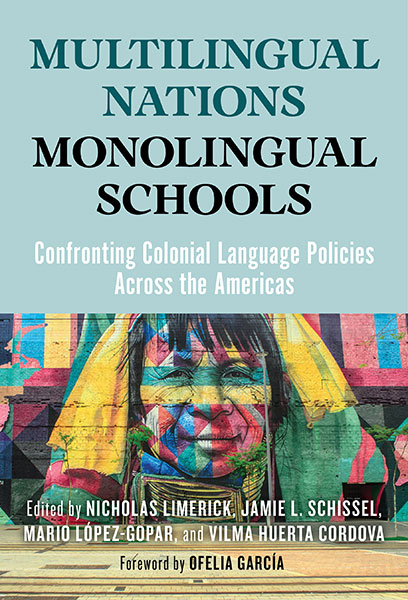Professors: Request an Exam Copy
Print copies available for US orders only. For orders outside the US, see our international distributors.
Edited by: Nicholas Limerick, Jamie L. Schissel, Mario López-Gopar, Vilma Huerta Cordova
Foreword by: Ofelia García
Publication Date: November 22, 2024
Pages: 224

"Multilingual Nations, Monolingual Schools is a powerful examination of the ongoing legacy of colonialism in shaping language education across the Americas today." —Nelson Flores, University of Pennsylvania
The effects of colonialism in education and society have deep and difficult legacies. This book argues that it is necessary to better understand the deep roots of colonialism in order to realize justice and overturn forms of oppression in education policy, in classrooms, or in family and community-based education.
Highlighting research from across Abya Yala with examples from various contexts throughout North, Central, and South America, chapter authors explore the ways that colonialism manifests in current educational policy and practice; how this happens through language use and communication; and, by starting locally, what comparisons can be gained from different cases across the continent.
Multilingual Nations, Monolingual Schools examines forms of communication and knowledge—such as Indigenous and/or colonial languages, standardized testing, and institutionally sanctioned forms of literacy—and seeks to historicize, provide further context, look at other cases, and follow encouraging examples with the goal of interrupting colonial trajectories.
Book Features:
Nicholas Limerick is an associate professor of anthropology and education at Teachers College, Columbia University. Jamie L. Schissel is an associate professor of teacher education and higher education at the University of North Carolina at Greensboro. Mario López-Gopar and Vilma Huerta Cordova are both professors in the faculty of languages at the Universidad Autónoma Benito Juárez in Oaxaca, Mexico.
"The authors describe a way of working where they read together, visit each other, write together, and heal together from the historical trauma that they have experienced . . . The diverse content and language practices of these stories enable us as readers to understand how, despite common experiences of racism and discrimination, identity groups are not simple static categories, but vary depending on people’s epistemic location that constitute them as complex and intersectional subjects.
—From the Foreword by Ofelia García, professor emerita, The Graduate Center, City University of New York
"Multilingual Nations, Monolingual Schools is a powerful examination of the ongoing legacy of colonialism in shaping language education across the Americas today. This book is an invaluable contribution to the fields of educational linguistics and decolonial studies."
—Nelson Flores, professor, University of Pennsylvania Graduate School of Education
“Multilingual Nations, Monolingual Schools brings together powerful contributions from education researchers across the Americas to rethink the goals of education and re-imagine what schools can be. They confront the persistence of coloniality in education policy and practice and identify how schools and testing can inadvertently contribute to ongoing marginalization of our most vulnerable students. Essential reading for teachers, teacher educators, and researchers.”
—Saskia Van Viegen, associate professor and ESL program coordinator, York University, Canada
“Essential reading for teachers, teacher educators, and researchers.”
—Saskia Van Viegen, York University, Canada
Professors: Request an Exam Copy
Print copies available for US orders only. For orders outside the US, see our international distributors.